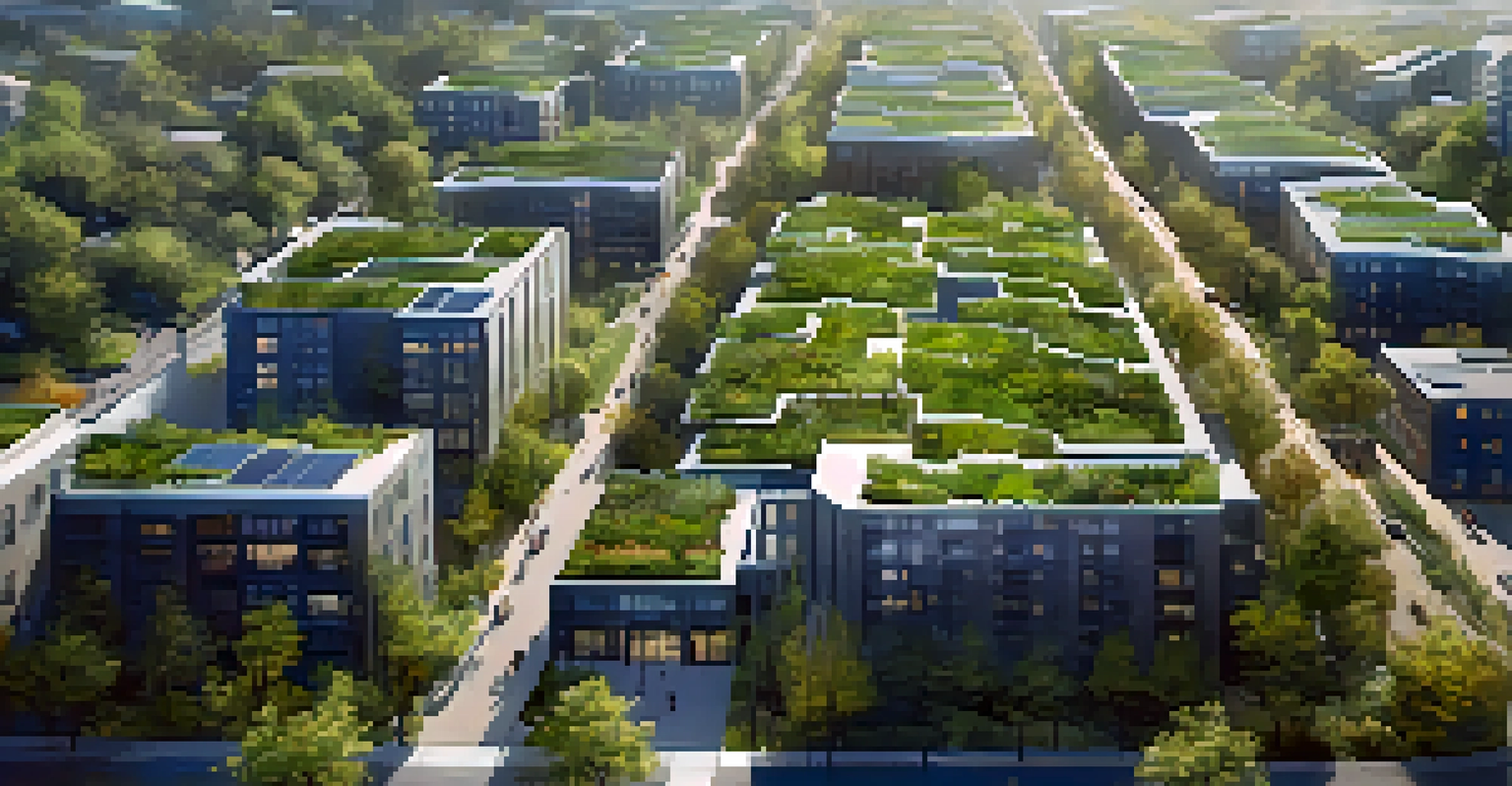Boulder's Climate Challenges: Adapting to Extreme Weather

Understanding Boulder's Unique Climate Challenges
Boulder, Colorado, is known for its stunning landscapes and outdoor lifestyle, but it's also facing significant climate challenges. Extreme weather events, such as heavy snowfall, intense storms, and droughts, are becoming more frequent. These changes can disrupt local ecosystems and impact the community's way of life. Understanding these challenges is the first step towards resilience and adaptation.
In nature's economy, the land is a community, and the community is a living organism.
The geographical location of Boulder plays a crucial role in its climate. Nestled against the foothills of the Rockies, the area experiences unique weather patterns that can lead to sudden temperature fluctuations. This unpredictability makes it difficult for residents and policymakers to plan effectively. As climate change intensifies, these challenges will likely grow, making it imperative to address them head-on.
Moreover, the community's reliance on water resources and agriculture adds another layer of complexity. With varying rainfall patterns and increasing temperatures, farmers and residents alike are feeling the pressure. Local government and organizations are tasked with finding sustainable solutions to ensure that Boulder's natural resources remain viable for future generations.
The Impact of Extreme Weather on Local Ecosystems
Extreme weather events have a profound impact on Boulder's local ecosystems. The changing climate affects plant and animal life, disrupting natural habitats and food chains. For instance, warmer temperatures can lead to earlier blooming seasons for flowers, which may not align with the life cycles of pollinators like bees. This mismatch can threaten biodiversity and disrupt the delicate balance of the ecosystem.

In addition, increased instances of wildfires pose a significant threat to Boulder's forests and wildlife. With drier conditions and higher temperatures, the risk of wildfires is on the rise. These fires not only destroy vast areas of natural beauty but also threaten air quality and public safety. As a result, the community must adapt by implementing fire prevention measures and restoring affected areas.
Boulder's Climate Challenges
Boulder faces significant climate challenges, including extreme weather events that disrupt local ecosystems and community life.
Water sources are also feeling the strain from extreme weather. Drought conditions can lead to decreased water levels in rivers and reservoirs, impacting both wildlife and human needs. Boulder's ecosystems are interconnected, so the health of its water bodies is crucial for sustaining the flora and fauna that thrive there. Protecting these resources requires a collaborative effort from residents, government, and environmental organizations.
Community Responses to Climate Change
Boulder's residents are not sitting idly by as climate challenges mount; instead, they're taking proactive steps to address these issues. Community groups, local governments, and individuals are banding together to create initiatives focused on sustainability. From tree-planting campaigns to water conservation efforts, the community is finding innovative ways to adapt to the changing climate.
We do not inherit the earth from our ancestors, we borrow it from our children.
One notable effort is the city's Climate Action Plan, which outlines strategies to reduce greenhouse gas emissions and increase resilience. This plan includes goals for renewable energy, improved public transportation, and green building practices. By prioritizing these initiatives, Boulder aims to not only mitigate the effects of climate change but also serve as a model for other cities facing similar challenges.
Moreover, local businesses are stepping up to the plate, embracing sustainable practices to minimize their environmental impact. From eco-friendly products to waste reduction programs, the business community in Boulder is playing a vital role in fostering a greener future. Collaboration between residents and businesses can create a stronger, more united front against climate challenges.
Innovative Solutions for Water Management
Water management is a critical concern for Boulder, especially amid changing weather patterns. Innovative solutions are being implemented to ensure that water resources remain sustainable. One such solution is the promotion of rainwater harvesting systems, which allow residents to collect and use rainwater for irrigation and other non-potable purposes. This practice not only conserves water but also reduces strain on the municipal supply.
Furthermore, the city is investing in infrastructure upgrades to improve the efficiency of its water delivery systems. By repairing leaks and modernizing piping, Boulder can minimize water loss and ensure that every drop counts. These upgrades also help mitigate the risks associated with extreme weather, such as flooding, by improving stormwater management.
Community Initiatives for Change
Residents and local businesses are actively engaging in sustainability initiatives to combat climate change and promote resilience.
Community education plays a vital role in effective water management as well. Residents are encouraged to adopt water-saving practices, such as xeriscaping, which involves landscaping with drought-resistant plants. By collectively embracing these strategies, Boulder can better navigate its water challenges and foster a culture of conservation.
The Role of Technology in Climate Adaptation
Technology is proving to be a powerful ally in Boulder's fight against climate change. From advanced weather monitoring systems to predictive analytics, innovative tech solutions are helping the city prepare for and respond to extreme weather events. These tools allow for more accurate forecasting, enabling residents and local authorities to make informed decisions that can mitigate damage and ensure safety.
Smart technology is also making waves in energy efficiency. Boulder's commitment to renewable energy sources, such as solar and wind, is supported by advancements in energy storage and management systems. By harnessing these technologies, residents can reduce their carbon footprint while still enjoying reliable energy. This shift not only benefits the environment but also enhances the community's resilience to climate challenges.
Moreover, the integration of technology into everyday life is encouraging a culture of sustainability. Apps and platforms that promote carpooling, energy tracking, and waste reduction are gaining popularity among Boulder residents. By embracing these tools, individuals can take tangible steps toward reducing their environmental impact, demonstrating that everyone has a role to play in addressing climate challenges.
Building Resilient Infrastructure for the Future
Resilience is key when it comes to adapting to the impacts of extreme weather, and Boulder is focusing on building infrastructure that can withstand these challenges. This includes retrofitting existing buildings to meet modern standards for energy efficiency and durability. By investing in resilient infrastructure, the city can better protect its residents and resources from the effects of climate change.
One example is the development of green roofs, which not only provide insulation but also absorb rainwater, reducing runoff and flooding. These roofs can transform urban spaces into more sustainable environments while enhancing biodiversity. As more buildings adopt these practices, the community can create a network of resilient structures that work together to mitigate climate impacts.
Innovative Water Management Solutions
Boulder is implementing innovative water management practices, such as rainwater harvesting and infrastructure upgrades, to ensure sustainable water resources.
Public transportation is another area where resilience is being prioritized. By expanding and improving public transit options, Boulder can reduce reliance on personal vehicles, lowering greenhouse gas emissions and traffic congestion. A robust public transportation system not only provides convenience for residents but also supports the city's overall sustainability goals.
Fostering Community Engagement and Education
Engaging the community is essential for effective climate adaptation, and Boulder is taking strides to involve residents in the conversation. Public forums, workshops, and educational programs are being organized to raise awareness about the impacts of climate change and the importance of community involvement. By fostering dialogue, residents can share ideas and collaborate on solutions that benefit everyone.
Schools in Boulder are also playing a crucial role in climate education, teaching students about sustainability and environmental stewardship. Programs that encourage outdoor learning and hands-on experiences empower the next generation to become advocates for the planet. As these young minds grow, they will carry forward the lessons learned and contribute to a more sustainable future.

Moreover, local organizations are creating volunteer opportunities that allow residents to actively participate in climate initiatives. Whether it's tree planting, clean-up events, or conservation projects, these hands-on experiences foster a sense of community and connection to the environment. By working together, Boulder can build a stronger, more resilient community well-equipped to face future climate challenges.